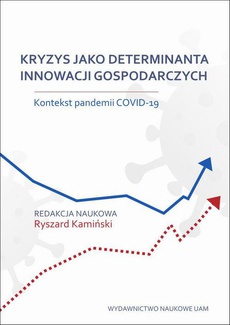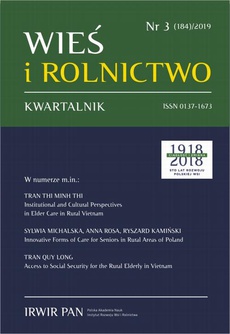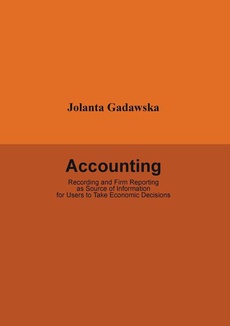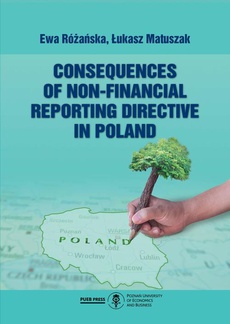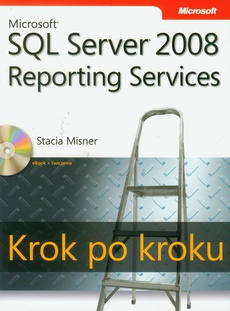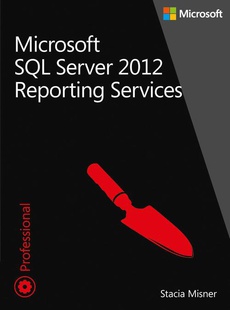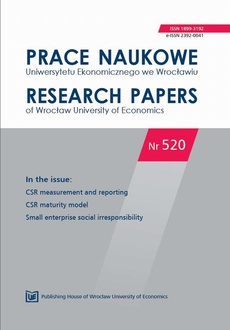INNE EBOOKI AUTORA
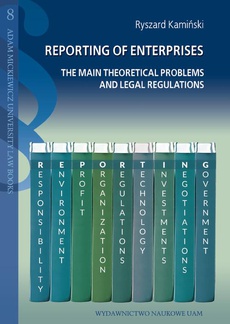
Reporting of enterpriss. The main theoretical problems and legal regulations
Autor:
Format:
ibuk
The monograph Reporting of enterprises. The main theoretical problems and legal regulations is part of the discussion about the current state and the future of accounting and corporate reporting. There is an opinion that new directions of theoretical considerations regarding this issue should be set, especially in the context of the current experience of the functioning of the enterprise achievement reporting system. The most important facts that affect the modern face of this system include: the progressing evolution of the paradigm regarding the role of the company in the socio-economic system (more and more often the company is perceived not only as an entity whose goal is to make profits, but also as an organization that is supposed to bring benefits to society, local community, customers and the like), as well as the use of information technology in accounting records, giving almost unlimited possibilities to process huge amounts of data in a short time. The response to these new challenges faced by enterprises was new legal regulations on an international, regional (EU) and national scale. They have been implemented in practice only recently, so they are still a new topic, making it necessary to clarify their essence and to provide further comments. This situation has become an inspiration for the preparation of this monograph, the content of which is focused on new legal regulations concerning primarily the system of reporting the company's achievements and its assessment. ( Powodem, dla którego napisałem tę monografię, była potrzeba wzięcia udziału w dyskusji na temat przyszłości rachunkowości i sprawozdawczości finansowej. Istnieje opinia, że należy wyznaczyć nowe kierunki teoretycznych rozważań dotyczących tej problematyki, zwłaszcza w kontekście obecnych doświadczeń funkcjonowania systemu sprawozdawczości finansowej i rachunkowości. Najważniejsze fakty, które wpływają na współczesne oblicze tego systemu, to - jak się wydaje – wykorzystanie technologii informacyjnej w ewidencji księgowej, dające niemal nieograniczone możliwości przetwarzania ogromnej liczby danych w krótkim czasie oraz postępująca ewolucja paradygmatu dotyczącego roli przedsiębiorstwa w systemie społeczno-gospodarczym. Coraz częściej firma postrzegana jest nie tylko jako podmiot, którego celem jest osiąganie zysków, ale także jako organizacja, która ma przynieść korzyści społeczeństwu (społeczności lokalnej, klientom itp.). Odpowiedzią na te nowe wyzwania, przed którymi stoją przedsiębiorstwa były nowe regulacje w skali krajowej, regionalnej (UE) i międzynarodowe. Wdrożenie ich w praktyce miało miejsce niedawno, więc wciąż stanowią nowy temat, powodujący konieczność wyjaśnienia ich istoty i komentarza w kontekście praktycznych doświadczeń. Sytuacja ta stała się uzasadnieniem przygotowania tej monografii, której treść koncentruje się właśnie na przedstawieniu nowych regulacji prawnych dotyczących przede wszystkim systemu raportowania firmy i jej oceny.)
| Rok wydania | 2019 |
|---|---|
| Liczba stron | 262 |
| Kategoria | Finanse i bankowość |
| Wydawca | Wydawnictwo Naukowe Uniwersytetu im. Adama Mickiewicza |
| ISBN-13 | 978-83-232-3539-2 |
| Numer wydania | 1 |
| Język publikacji | angielski |
| Informacja o sprzedawcy | ePWN sp. z o.o. |
POLECAMY
Ciekawe propozycje
Spis treści
| Preface | 9 |
| List of acronyms 11 | |
| Introduction | 13 |
| Chapter I 17 | |
| Financial accounting as a source of business information | 17 |
| 1.1. The concept of accounting and its functions | 17 |
| 1.2. Accounting principles | 21 |
| 1.3. Users of information provided by accounting | 24 |
| 1.4. Legal accounting regulations in Poland The Accounting Act | 28 |
| 1.4.1. Sources of accounting law in Poland | 28 |
| 1.4.2. The structure of the Accounting Act | 29 |
| 1.4.3. Areas regulated by the Accounting Act | 31 |
| 1.4.3.1. Accounting policies | 32 |
| 1.4.3.2. Account books | 34 |
| 1.4.3.3. Inventory | 36 |
| 1.4.3.4. Valuation methods | 38 |
| 1.5. Final remarks | 40 |
| Chapter II 43 | |
| Financial statements as the final product of the accounting system in the light of basic theoretical concepts and Polish regulations 43 | |
| 2.1. The concept of financial statements, their purpose and types | 43 |
| 2.2. “True and fair view” as the main principle of preparing financial statements | 46 |
| 2.3. Quality characteristics of financial statements | 49 |
| 2.4. Financial statements according to the Accounting Act | 51 |
| 2.4.1. Preparation of financial statements | 51 |
| 2.4.2. Balance sheet as a static account of assets and equity | 53 |
| 2.4.3. Profit and loss account | 58 |
| 2.4.4. Statement of changes in equity (found) | 62 |
| 2.4.5. Cash flow statement | 65 |
| 2.4.6. Notes to financial statements | 70 |
| 2.5. Management report | 71 |
| 2.6. Financial reporting of micro entities | 73 |
| 2.7. Financial reporting of small entities | 77 |
| 2.8. Consolidated financial report | 79 |
| 2.9. Examination of financial statements | 82 |
| 2.10. Approval, availability and publication of the financial statements | 85 |
| 2.11. Final remarks | 88 |
| Chapter III 89 | |
| International regulation of financial statement | 89 |
| 3.1. The accounting harmonisation process | 89 |
| 3.2. Financial reporting according to the International Accounting Standards Board | 93 |
| 3.2.1. Conceptual framework of financial reporting | 93 |
| 3.2.2. Statement of financial position | 97 |
| 3.2.3. Statement of profit or loss and other comprehensive income | 100 |
| 3.2.4. Statement of the cash flows | 105 |
| 3.2.5. Statement of changes in equity | 107 |
| 3.2.6. Notes to financial statements | 108 |
| 3.3. International Financial Reporting Standard for Small and Medium-sized Companies | 113 |
| 3.4. European Union regulations | 121 |
| 3.5. Common financial reporting concept of IASB and FASB | 127 |
| 3.6. Final remarks | 134 |
| Chapter IV 135 | |
| Reporting of non-financial information | 135 |
| 4.1. The essence of reporting non-financial information | 135 |
| 4.2. Practice of reporting non-financial information | 137 |
| 4.3. Actions for the standardization of non-financial information reporting | 141 |
| 4.4. Non-financial reporting under EU Directives | 144 |
| 4.4.1. Directives 2013/34/EU and 2014/95/EU | 144 |
| 4.4.2. Guidelines on disclosure of non-financial information | 148 |
| 4.5. Non-financial reporting under Polish regulation | 152 |
| 4.7. Final remarks | 156 |
| Chapter V | 159 |
| Integrated reporting as a holistic model of showing the results of the company’s operations 159 | |
| 5.1. The essence of integrated reporting | 159 |
| 5.2. Efforts for standardization of integrated reports | 162 |
| 5.2.1. Integrated reporting framework of IIRC | 162 |
| 5.2.2. GRI guidelines | 166 |
| 5.3. Integrated reporting in practice | 169 |
| 5.4. Final remarks | 174 |
| Chapter VI 177 | |
| Shaping financial reporting by enterprises in theory and practice | 177 |
| 6.1. The right of choice as the premise of accounting policy | 177 |
| 6.2. The goals and instruments of the accounting policy of an enterprise | 182 |
| 6.3. Limits of creativity in accounting | 187 |
| 6.4. The essence of fraudulent accounting | 194 |
| 6.5. The reasons for financial and accounting crimes and their favorable circumstances | 196 |
| 6.6. Methods of accounting fraud | 200 |
| 6.7. Final remarks | 205 |
| Chapter VII 207 | |
| Measures to ensure high quality of financial statements of enterprises | 207 |
| 7.1. The essence of the system of supervision and control of financial reporting | 207 |
| 7.2. The reform of the system of supervision of public enterprises in the USA(The Sarbanes-Oxley Act) | 211 |
| 7.3. Directives of the European Union | 216 |
| 7.4. Regulations in force in Poland | 220 |
| 7.5. Corporate governance – part of the system of supervision of financial statements | 223 |
| 7.6. Ethical norms | 230 |
| 7.7. Final remarks | 237 |
| Conclusions | 239 |
| References | 241 |
| List of acts | 257 |
| Other sourses | 261 |
| List of figures and tables | 262 |

